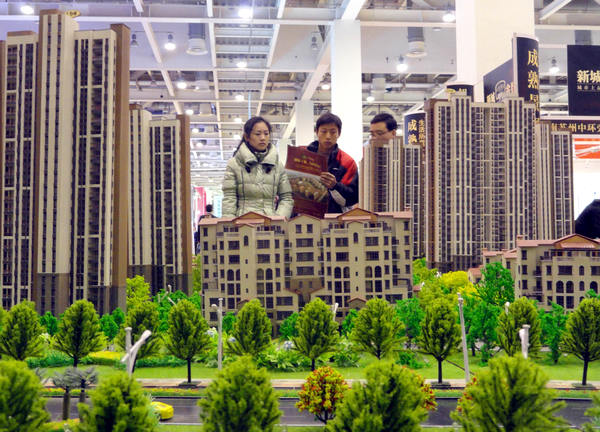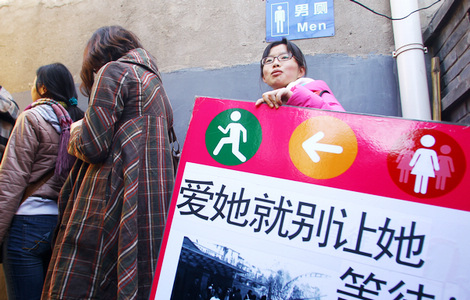|
|||||||||||
BEIJING - China is not likely to loosen its rigorous real estate policies in the short term but may give the market a bigger role in setting prices in the long run, industry analysts said ahead of the opening of the two major political sessions.
"The central government will probably maintain its existing real estate policies in the short run," said Qin Xiaomei, chief researcher at Jones Lang LaSalle (JLL Beijing).
|
 |
|
Potential homebuyers at a real estate exhibition in Suzhou, Jiangsu province, on Sunday. Analysts said that the nation's policies are unlikely to change in the short term and the government still aims to bring home prices down to a reasonable level. [Wang Jiankang / for China Daily] |
However, in the long term, the government will let financial factors play a bigger role in setting prices, such as by collecting property taxes instead of restricting home purchases, Qin added.
Since the start of 2011, the government has moved to cool property prices, such as requiring higher minimum downpayments and setting limits on the number of homes a family could buy in some cities.
Government control of the property market will be among the hottest topics among deputies of the upcoming annual sessions of National People's Congress and Chinese People's Political Consultative Conference in Beijing.
"Some measures, such as restricting the amount of homes a family could purchase, will be gradually phased out once property prices fall back to a reasonable level," said Carlby Xie, head of research at real estate consultancy Colliers International (Beijing).
People who have held Shanghai resident cards for more than three years are eligible to buy a second home despite their non-permanent residence status, a municipal housing official confirmed to local media on Wednesday for the first time, triggering market rumors that housing regulations would be eased in the city.
Before that, Wuhu, a third-tier city in eastern Anhui province, abruptly halted a plan to give home buyers subsidies for residences smaller than 90 square meters.
The policy shift reflected both the central government's determination to continue its policies as well as the local government's fiscal plight, said Xie.
China Index Academy, a Beijing-based real estate consultancy institute, reported that revenue from land sales in the 300 large cities that it monitors fell 67 percent year-on-year in January.
Beijing's revenue from land sales is expected to drop by 30 percent this year to 90 billion yuan ($13.6 billion), making it the worst year on record, the local bureau of finance said.
Shanghai likewise lowered its forecast for land sales revenue this year to 125 billion yuan, which would be down 16.2 percent year-on-year, according to the local bureau of finance.
"The government needs to achieve a balance between maintaining sound economic growth while deflating the real estate bubble, and the local governments also need other alternatives to back up revenues when land sales plummet," said Qin. "It is all about a balance."
Though the central government has reiterated that its policies wouldn't change, there's been some sign of fine-tuning in the market as prices fall.
Some banks in Beijing and Shanghai, for instance, began to offer first-home buyers' mortgages at the benchmark level, compared with higher rates before.
With the property market continuing to cool, some economists are concerned that a larger-than-expected correction would mean a hard landing for the world's second-largest economy.
Some foreign institutional investors forecast a gradual loosening in real estate policies in the second half.
Wee Liat Lee, regional head of property at Samsung Securities (Asia), said the government should become cautious about an over-correction in property prices, which would inevitably affect the economy.
Property prices in more than two-thirds of China's major cities dropped further in January from the previous month.
Of 70 major cities monitored by the government, prices fell month-on-month in 48, according to the National Bureau of Statistics.
Related Stories
Chinese economy not to face hard landing: expert 2012-02-21 13:25
China prioritizes systematic financial risk control 2012-02-21 00:18
Hot Topics
Wu Ying, iPad, Jeremy Lin, Valentine's Day, Real Name, Whitney Houston, Syria,Iranian issue, Sanyan tourism, Giving birth in Hong Kong, Cadmium spill, housing policy
Editor's Picks

|

|

|

|

|

|







